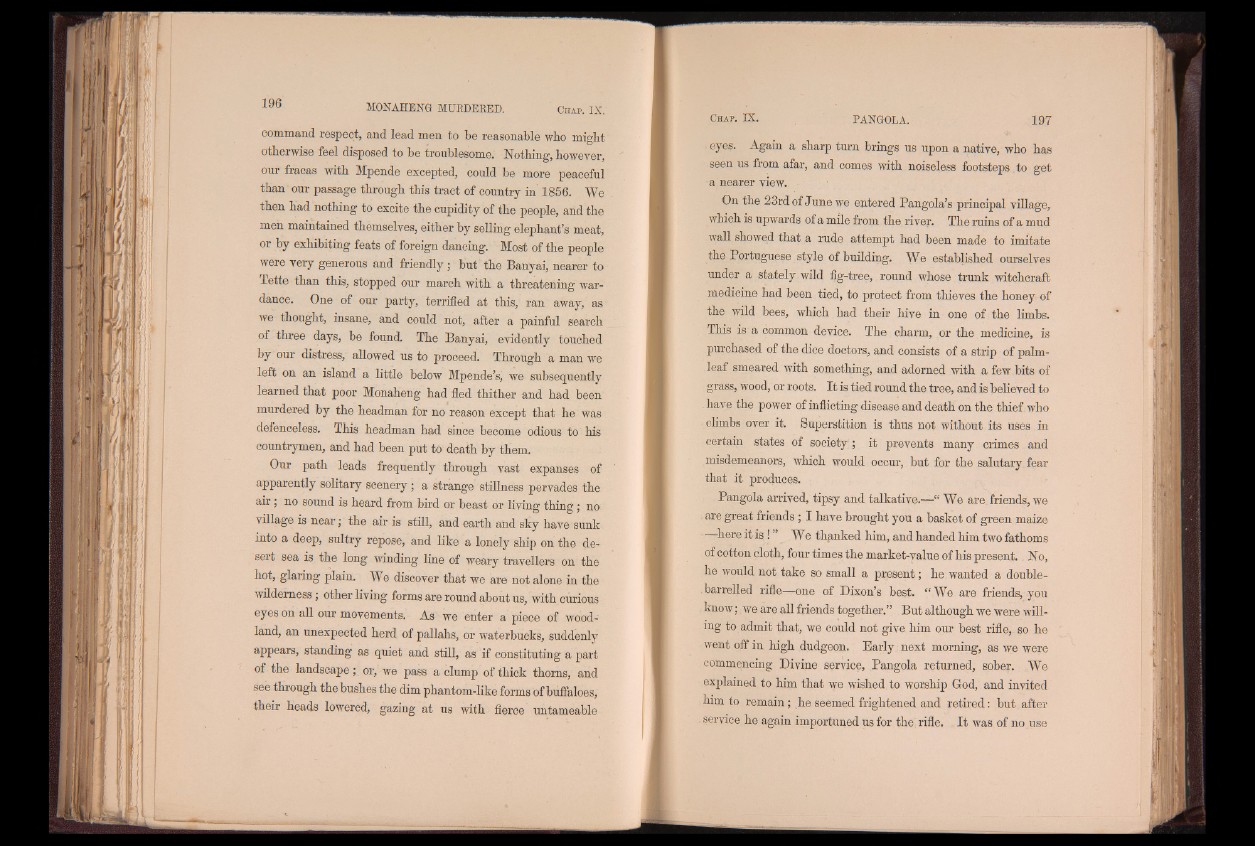
command respect, and lead men to be reasonable who might
otherwise feel disposed to be troublesome. Nothing, however,
our fracas with Mpende excepted, could be more peaceful
than our passage through this tract of country in 1856. We
then had nothing to excite the cupidity of the people, and the
men maintained themselves, either by selling elephant’s meat,
or by exhibiting feats of foreign dancing. Most of the people
were very generous and friendly; but the Banyai, nearer to
Tette than this, stopped our march with a threatening war-
danee. One of our party, terrified at this, ran away, as
we thought, insane, and could not, after a painful search
of three days, be found. The Banyai, evidently touched
by our distress, allowed us to proceed. Through a man we
left on an island a little below Mpende’s, we subsequently
learned that poor Monaheng had fled thither and had been
murdered by the headman for no reason except that he was
defenceless. This headman had since become odious to his
countrymen, and had been put to death by them.
Our path leads frequently through vast expanses of
apparently solitary scenery; a strange stillness pervades the
a ir; no sound is heard from bird or beast or living thing; no
village is near; the air is still, and earth and sky have sunk
into a deep, sultry repose, and like a lonely ship on the desert
sea is the long winding line of weary travellers on the
hot, glaring plain. We discover that we are not alone in the
wilderness; other living forms are round about us, with curious
eyes on all our movements. As we enter a piece of woodland,
an unexpected herd of pallahs, or waterbucks, suddenly
appears, standing as quiet and still, as if constituting a part
of the landscape; or, we pass a clump of thick thorns, and
see through the bushes the dim phantom-like forms of buffaloes,
their heads lowered, gazing at us with fierce untameable
eyes. Again a sharp turn brings us upon a native, who has
seen us from afar, and comes with noiseless footsteps to get
a nearer view.
On the 23rd of June we entered Pangola’s principal village,
which is upwards of a mile from the river. The ruins of a mud
wall showed that a rude attempt had been made to imitate
the Portuguese style of building. We established ourselves
under a stately wild fig-tree, round whose trunk witchcraft
medicine had been tied, to protect from thieves the honey of
the wild bees, which had their hive in one of the limhs.
This is a common device. The charm, or the medicine, is
purchased of the dice doctors, and consists of a strip of palm-
leaf smeared with something, and adorned with a few bits of
grass, wood, or roots. I t is tied round the tree, and is believed to
have the power of inflicting disease and death on the thief who
climbs over it. Superstition is thus not without its uses in
certain states of society ; it prevents many crimes and
misdemeanors, which would occur, but for the salutary fear
that it produces.
Pangola arrived, tipsy and talkative.—“ We are friends, we
are great friends; I have brought you a basket of green maize
here it is ! ” We thanked him, and handed him two fathoms
of cotton cloth, four times the market-value of his present. No,
he would not take so small a present; he wanted a double-
barrelled rifle—one of Dixon’s best. “ We are friends, you
know; we are all friends together.” But although we were willing
to admit that, we could not give him our best rifle, so he
went off in high dudgeon. Early next morning, as we were
commencing Divine service, Pangola returned, sober. We
explained to him that we wished to worship G-od, and invited
him to remain; he seemed frightened and retired: but after
. service he again importuned us for the rifle. I t was of no use